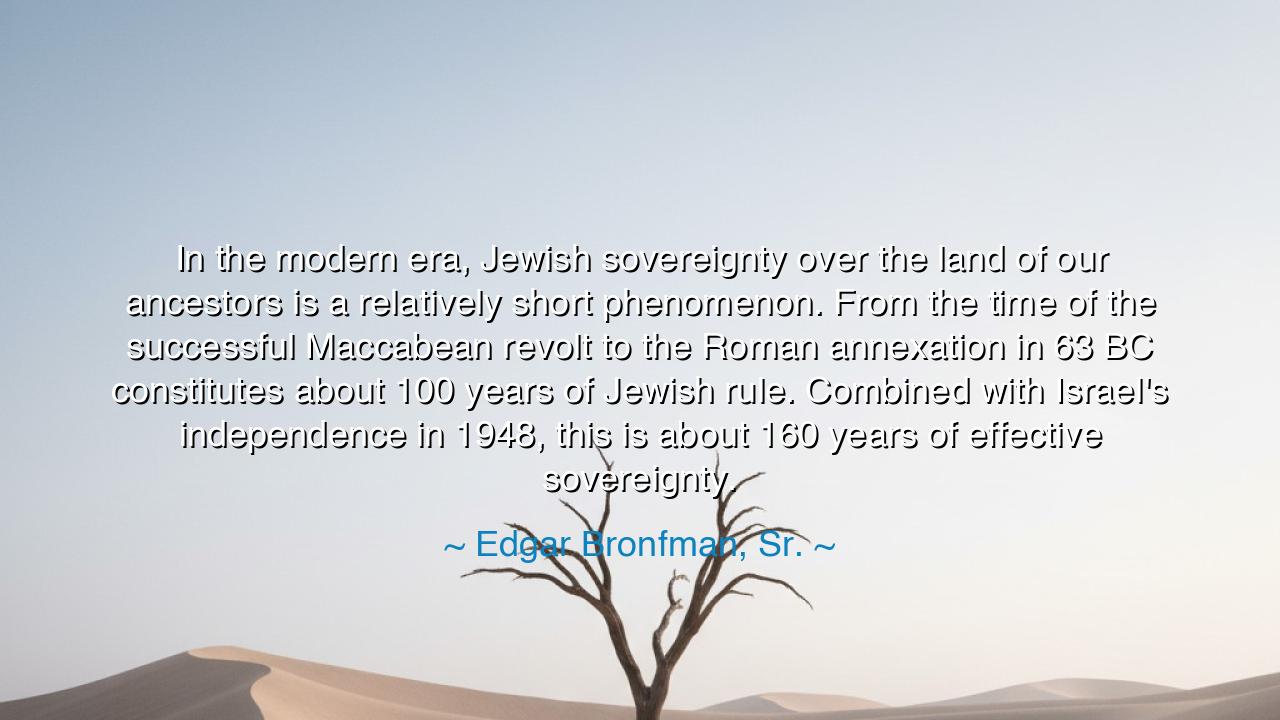
In the modern era, Jewish sovereignty over the land of our
In the modern era, Jewish sovereignty over the land of our ancestors is a relatively short phenomenon. From the time of the successful Maccabean revolt to the Roman annexation in 63 BC constitutes about 100 years of Jewish rule. Combined with Israel's independence in 1948, this is about 160 years of effective sovereignty.






"In the modern era, Jewish sovereignty over the land of our ancestors is a relatively short phenomenon. From the time of the successful Maccabean revolt to the Roman annexation in 63 BC constitutes about 100 years of Jewish rule. Combined with Israel's independence in 1948, this is about 160 years of effective sovereignty." – Edgar Bronfman, Sr.
Hear these words, O keepers of memory and seekers of truth, for Edgar Bronfman, Sr., a man of wisdom and vision, speaks here not only of history, but of the endurance of a people whose spirit has outlasted empires. His reflection is not one of lamentation, but of awe — that after centuries of exile, persecution, and wandering, the Jewish people have twice in all of recorded time held sovereignty over their ancient homeland. In that rarity lies both tragedy and triumph — a reminder of how fragile freedom is, and how sacred it becomes when reclaimed.
The meaning of his words reaches deep into the heart of civilization itself. Bronfman reminds us that Jewish sovereignty — the power of the Jewish people to govern their ancestral land — has existed for only a brief span in the long tapestry of human history. He speaks first of the Maccabean revolt, that uprising of faith and courage led by the sons of Mattathias against the Seleucid Empire. In that moment of defiance, outnumbered and outarmed, the Maccabees reclaimed Jerusalem and purified the desecrated Temple. Their victory gave birth to the Hasmonean dynasty — the first taste of national freedom the Jewish people had known since the days of David and Solomon. Yet even that light, fierce as it was, endured for but a century before being extinguished by Rome’s iron grasp.
Then, Bronfman turns his gaze to the rebirth of Israel in 1948, when the descendants of those ancient rebels, after two thousand years of exile, rose again to claim their home. In that moment, history circled back upon itself, and what had once seemed impossible became real. The dream of independence, long sung in prayer and preserved in hope, became a living nation once more. Together, these two periods — the Hasmonean rule and the modern State of Israel — amount to only about 160 years of sovereignty in more than three millennia of history. Yet within those years lies the proof that no exile, however long, can erase the covenant between a people and their land.
The origin of this reflection lies not only in numbers, but in spirit. Bronfman’s words come from a heart that understands that the story of the Jewish people is not one of dominance, but of endurance. Empires rose and fell — Babylon, Persia, Greece, Rome — yet the Jewish people, scattered and stateless, carried with them the memory of Jerusalem, the rhythm of the Hebrew tongue, and the hope of return. When the Romans tore down the Second Temple and scattered Israel’s sons and daughters across the earth, they sought to erase a nation. But the flame endured, kept alive by those who refused to forget. That survival, that unbroken thread of identity across centuries, is itself a form of sovereignty — one not written in law, but in the soul.
Consider the story of the Hanukkah lights, born from that first period of independence. When the Maccabees entered the desecrated Temple, they found only a single jar of oil — enough to burn for one day. Yet it burned for eight, symbolizing not the might of armies, but the miracle of perseverance. In the same way, Jewish sovereignty — brief though it may seem in the sweep of history — has burned brighter and longer than logic would allow. It stands as testimony that faith, when joined with courage, can defy even the centuries.
Bronfman’s reflection, however, is not simply about the past — it is a warning to the present. He reminds us that sovereignty is not a permanent gift; it is a responsibility that must be guarded with wisdom and unity. The lesson is clear: the fragility of freedom demands vigilance. A people who forget the cost of independence risk losing it again. To sustain liberty, one must cultivate not only power, but purpose, compassion, and moral strength. The true test of a nation is not how it is born, but how it endures — whether it can balance security with justice, pride with humility, faith with reason.
So, let these words be carried forward as both tribute and teaching. The briefness of Jewish sovereignty is not a measure of weakness, but of wonder — proof that history bends, at last, toward redemption. Let future generations remember that even if freedom endures for only a handful of centuries within millennia of struggle, those few centuries are sacred beyond measure. For they are built upon the sacrifices of countless generations who kept faith alive in the darkness. And let all who cherish freedom, in any nation, heed the ancient truth behind Bronfman’s reflection: that independence, once won, must be tended as one tends a flame — with vigilance, reverence, and love — lest the winds of time ever seek to extinguish it again.






AAdministratorAdministrator
Welcome, honored guests. Please leave a comment, we will respond soon